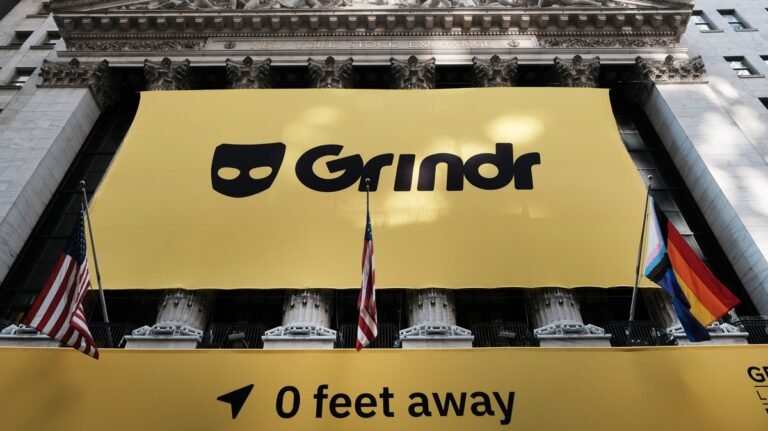Grindr on the NYSE. Image Credit: Getty Images
LGBTQ dating app Grindr has issued a new return-to-office policy requiring staff to relocate to other cities, just two weeks after its workers announced they were unionizing with the Communications Workers of America. The certification form, sent to workers on Monday night and obtained by Motherboard, states that the policy requires workers to either move within 50 miles of their newly designated office or lose their jobs.
Workers told Motherboard that the policy was first announced on Thursday, during a previously scheduled all-hands meeting, and that it was the first time they had heard from management since the unionization was announced.
“We announced our union on July 20 and then we heard literally nothing from Grindr management until Thursday, when they announced that we all had two weeks to decide whether we were going to move across the country or get fired,” said Quinn McGee, a trust and safety product manager and organizer at Grindr United CWA. “As soon as George [Arison, Grindr’s CEO] stopped talking, one of my colleagues began to ask a question about all of us suddenly having to uproot our lives—and they cut the call.”
“The root of the problem here is that it’s an extremely disrespectful and rude way to convey this kind of dramatic change,” said Jack Alto, a staff software engineer and union organizer.
On Monday night, Grindr management sent out a return-to-office certification form, which was obtained by Motherboard. The form asked workers to declare whether they lived within 50 miles of their designated office, and if not, whether they were willing to move by October 3. If workers were not willing to relocate to their new offices—Chicago for the engineering team, Alto said, and Los Angeles or the San Francisco Bay Area for the product and design teams—their jobs would end on August 31. By choosing this option, workers would receive six months of severance pay and COBRA healthcare benefits, the memo states.
“Any team member who does not complete and return this form by August 17, 2023 will be considered not to have agreed to comply with Grindr’s hybrid work policy and RTO plan and/or to have declined to relocate, (if applicable),” the notice states. “Those team members will be offered the applicable severance package (including a separation agreement and release) and their last day of employment with Grindr will be August 31, 2023.”
A screenshot of the return-to-office certification sent to Grindr staff Monday.
The form states that Grindr was “excited about its hybrid work model” and how it would “foster the inclusive culture and community we so deeply believe in.” In a memo reported by Bloomberg, CEO George Arison claimed that the company had been working on the policy “for many months.”
“It’s not even a well-drawn-out plan,” said McGee, who mainly works out of their home in New York City. “They have not told us where the office in the Bay Area is going to be. If this was indeed planned for months as they’re claiming, why isn’t there a lease? They’ve sublet a WeWork space that I would wager, given the WeWork space that we have in New York, is not big enough for the entire product design team that they’ve told to move to California. So where do they expect us to be working?”
A Grindr spokesperson did not respond to a request for comment.
“To tell me that I have two weeks to decide whether or not to uproot my family’s life, for a job that won’t come to the table and speak with me as an adult—it’s dehumanizing,” McGee said. “This is a very, very difficult time in the country right now for trans people. This is hard for anybody, but particularly for trans people. That they have to uproot themselves from where they have found safety and security and family is appallingly cruel. Telling us to move to cities where we don’t have medical providers. It’s appalling. I’m lost for words.”
Workers first started organizing in December of last year, Alto said, after Grindr became a public company and they started seeing some “worrying signs.”
“Our demands as a union can basically be summarized as, ‘We like our jobs. We like our benefits. We would like to codify these in writing so that the rug doesn’t get pulled out from under us,’” Alto said. “And Grindr management’s response, likely at the urging of Littler Mendelson, has been to pull the rug out from under us faster.”
Littler Mendelson is a law firm that says it specializes in “initiating strategies that lawfully avoid unions.” The CWA announced that Grindr had hired the firm on Friday. The union also filed an unfair labor practice charge against the company claiming the new policy was retaliatory to unionizing workers.
“This requirement to return to in-person work threatens employees with job loss if they either do not work near an in-person office or relocate to an area near the in-person office and constitutes a change in its disciplinary system,” the charge states.
“The queer voices that are the workers of Grindr engaged in protected organizing activity, and asked for voluntary recognition, and were ghosted,” McGee said. “We want a strong Grindr. We want a successful Grindr that works for all the people who use it as a welcoming place for the whole LGBTQ community. And we want to build it together. There’s still time to do the right thing. All they have to do is say yes, and it would be that easy.”
